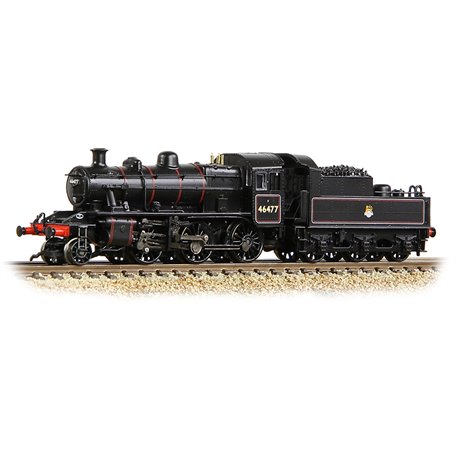No products
Product successfully added to your shopping cart
There are 0 items in your cart. There is 1 item in your cart.
LMS Ivatt 2MT 46477 BR Lined Black (Early Emblem)
372-626A
Graham Farish
LMS Ivatt 2MT 46477 BR Lined Black (Early Emblem)
This product is out of stock
| Scale | N (1/148 - 1/160) |
| Material | Mixed |
| Assembly | Ready to use |
| Finish | Painted |
More info
LMS Ivatt 2MT 46477 BR Lined Black (Early Emblem)
We are delighted to present this Graham Farish LMS Ivatt 2MT following the recent SOUND FITTED upgrades to this model. With every model now featuring a Next18 DCC decoder interface and pre-fitted speaker, this example depicts No. 46477 in BR Lined Black livery with Early Emblem.
This Award Winning model certainly packs a punch when it comes to the detail, with separate metal handrails found throughout the locomotive and tender, lubricators and sand boxes along the running plate and separate pipework running from below the cab to the top feed on the boiler. The turned brass safety valves and whistle contrast beautifully with the firebox on which they are mounted, whilst inside the cab, the moulded back head detail has been decorated to pick out the individual gauges and controls. A hinged tender fall-plate provides the finishing touch to the highly impressive cab of this model.
When it comes to performance it’s hard not to marvel as you watch the Walschaerts valve gear in motion. The powerful coreless motor provides drive to the centre pair of driving wheels, whilst all six driving wheels are fitted with separate metal bearings and a pair of traction tyres are fitted to the rear driving wheels to aid traction. Electrical pick-up comes via all six driving wheels and all six tender wheels, with a semi-permanent loco-tender coupling system to ensure the two stay firmly coupled at all times. Additional traction tyres are available separately (item No. 379-423), along with the ModelMaker N Scale Loco Crankpin Box Spanner (item No. MM027) – an essential part of any N scale tool kit.
MODEL FEATURES:
Graham Farish N Scale
Era 4
Pristine BR Lined Black (Early Emblem) livery
Running No. 46477
Accessory Pack
NEM Coupling Pockets
Powerful Coreless Motor
Loco-drive Mechanism
Tender Pick-ups
Speaker Fitted
Equipped with a Next18 DCC Decoder Socket – Recommend Decoder item No. 36-567A
Length 112mm
IVATT 2MT HISTORY
Designed by H. G. Ivatt for the London, Midland & Scottish Railway (LMS), 128 of these Class 2 Moguls were built for light freight and passenger duties. With construction commencing in 1946, just twenty examples were built by the LMS and the remaining 108 were outshopped by British Railways following Nationalisation in 1948. The construction programme was completed in 1952 and these Mixed Traffic locomotives would go on to operate on all the BR regions, with the exception of the Southern. Light axle loadings allowed the Ivatt 2MTs to be used on most routes including branch lines, where their almost enclosed cabs made them ideal for working tender first when no turning facilities existed. The design provided the basis for the BR Standard Class 2MT 2-6-0, and the two are very similar in appearance, with the Standard version having only a modified cab and tender profile to allow unrestricted route availability across the British network.
With BR progressively closing more and more branch lines, and rationalising others – often employing new diesel multiple units to provide a more economical passenger service – duties for small locomotives like the Ivatt 2MTs began to disappear and the decline of the class began in 1961 when the first example was withdrawn. The Mogul’s versatility and its relatively modern design however ensured that many examples were still in traffic until the mid-1960s, but by 1967 all had been withdrawn. Thankfully, seven Ivatt 2MT have been preserved and the type is an ideal source of motive power for many of the trains running on heritage railways today.







